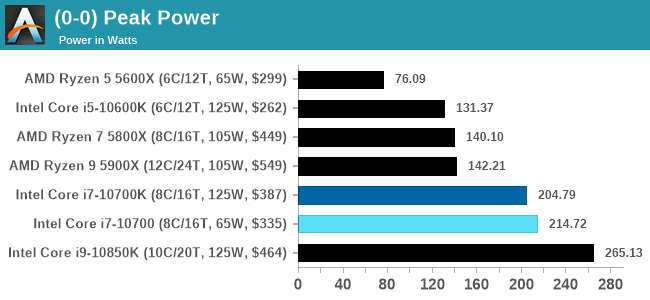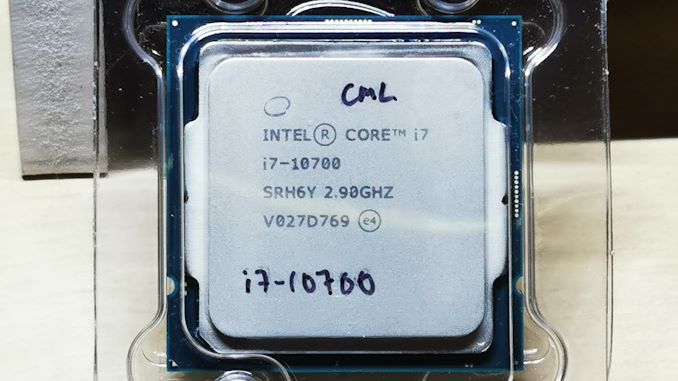Intel Core i7-10700 vs Core i7-10700K Review: Is 65W Comet Lake an Option?
by Dr. Ian Cutress on January 21, 2021 10:30 AM EST- Posted in
- CPUs
- Intel
- Core i7
- Z490
- 10th Gen Core
- Comet Lake
- i7-10700K
- i7-10700
Conclusion: TDP is Not Fit For Purpose
In years gone by, processors were sold with a single frequency and power rating. It was very quickly realized that if a processor could effectively go to sleep, using either lower voltage or lower frequency (or both) then a lot of idle power could be saved. Going the other way, processor designers realized that for temporary short bursts, a core could run at a higher frequency before it reached a thermal limit. Also, using a multi-core processor meant that either the power budget could be shared across all the cores, or it could be focused in one.
Both AMD and Intel have noticed this over time, and both companies have different attitudes on how they report numbers relating to ‘base frequency’ and related power as well as the bursty ‘turbo frequency’ and related power. Out of those four metrics, the only one Intel doesn’t provide is turbo power, because from their perspective it is system dependent.

Intel lets motherboard manufacturers determine how long a system can turbo for, and what that budget is. Intel encourages motherboard manufacturers to over-engineer the motherboards, not only for overclocking, but for non-overclockable CPUs to get the best performance for longer. This really messes up what the ‘default out-of-the-box performance’ should be if different motherboards give different values. The trend lately is that enthusiast motherboards enable an unlimited turbo budget, and the user building their system just has to deal with it.
This means that users who buy the Core i7-10700 in this review, despite the 65 W rating on the box, will have to cater for a system that will not only peak around 215 W, but sustain that 215 W during any extended high-performance load, such as rendering or compute. We really wished Intel put this 215 W value on the box to help end-users determine their cooling, as without sufficient guidance, users could be hitting thermal limits without even knowing why. At this point, 'Intel Recommended Values' for turbo time and budget mean nothing outside of Intel's own OEM partners building commercial systems.
Core i7-10700 vs Core i7-10700K Performance
In the review we highlighted that these two processors have a peak turbo frequency difference of 300 MHz and an all-core turbo frequency difference of 100 MHz. The fact that one is rated at 65 W and the other is rated at 125 W is inconsequential here, given that most end-user motherboards will simply enable turbo all the time. This means the performance in most of our tests between the two is practically identical, and consummate to a 100-300 MHz frequency difference.
In practically all of our tests, the Core i7-10700K is ahead by a super slim margin. At $387 for the 10700K compared to $335 for the 10700, the performance difference is not enough to warrant the $52 price difference between the two. Performance per dollar sides mostly with the Core i7-10700, although users getting the i7-10700K will likely look towards overclocking their processor to get the most out of it – that ultimately is what to pay for.
The other comparison point is with the Ryzen 5 5600X, which has two fewer cores but costs $299. In practically every test, the increased IPC of the Ryzen over Intel means that it sits identical with the Core i7 processors, AMD is cheaper on list price, and at a much lower power (AMD will peak around 76 W, compared to 215 W). AM4 motherboards are also abundant, while corresponding Intel motherboards are still expensive. The problem here however is that AMD is having such high demand for its product lines right now that finding one in stock might be difficult, and it probably won’t be at its recommended price.
Users in this price bracket have a tough choice – the more efficient AMD processor that might be in stock, compared to the Intel processor that will be in stock but more cooling will likely be required.











210 Comments
View All Comments
Oxford Guy - Sunday, January 24, 2021 - link
This site posted articles about overclocking that were done wildly, without true stability testing and with reckless amounts of voltage and you're going to now pretend that turning on XMP for RAM is some kind of terrible reckless matter?Oxford Guy - Sunday, January 24, 2021 - link
The thing is... if you wish to take a stand about JEDEC and company standards that's fine. Just don't post a lot of nonsensical reasons for it, like "Most users don't know how to plug in a computer so we're going to skip the plug for this review".Oxford Guy - Sunday, January 24, 2021 - link
Personally, here is all I'd say on the subject, were I to be taking your stand:'We use JEDEC standards for RAM speed because those are what AMD, Intel, and other CPU makers use to rate their chips. Anything beyond JEDEC is overclocking and is therefore running out of spec.
Although motherboard makers frequently choose to run CPUs out of spec, such as by boosting to the turbo speech and keeping it there indefinitely, and by including XMP profiles for RAM with lists of 'compatible' RAM running beyond JEDEC, it is our belief that the best place for a CPU's maximum supported RAM speech spec to come from is from the CPU's creator.
If anyone is unhappy about this standard we suggest lobbying the CPU makers to be more aggressive about officially supporting faster RAM speeds, such as by formally adopting XMP as a spec that is considered to be within spec for a CPU.
To compliment the goal of our JEDEC stance, are going to only create reviews using motherboards that fully comply with the turbo spec of vendors and/or disable all attempts by board makers to game that spec. If a board cannot be brought into full compliance we will refuse to post a review of it and any mention of it with the possible exception of a list of boards that run out of spec, are non-compliant.'
Qasar - Sunday, January 24, 2021 - link
Oxford Guy you seem to be quite unhappy about this review, and by other posts, the site as well, so if this site is so bad, WHY do you keep coming here ?Spunjji - Monday, January 25, 2021 - link
He's certainly not his own best advocate in that regard.I'd always defend someone's right to criticise aspects of something they otherwise like, but sometimes it goes a bit far.
Oxford Guy - Monday, January 25, 2021 - link
'but sometimes it goes a bit far.'Extreme vagueness + ad hom = extra fail.
Spunjji - Wednesday, January 27, 2021 - link
@Oxford Guy - 🙄1) That wasn't an ad-hominem - if you're going to do the "master debater" thing, at least learn to distinguish between commentary on the person and their argument.
2) Re: "extreme vagueness" - that was my personal opinion stated as a colloquialism. I don't owe anyone an annotated list of every comment you made, metric measurements of precisely how far they went, an objectively-defined scale of how far is too far, and a peer-reviewed thesis on the precise moment at which you exceeded that point.
Oxford Guy - Monday, January 25, 2021 - link
Ad hom... how unsurprising.To answer your question — This site is not bad. This site is good because people are able to give their honest opinions instead of living in a disgusting echo chamber like on ArsTechnica or Slashdot.
Perhaps that's where YOU should go instead.
Qasar - Tuesday, January 26, 2021 - link
why would i go there ? this site is top notch when it comes to reviews and comp hardware news. "This site is good because people are able to give their honest opinions " yes, but sometimes, some go to far with the whining and complaining :-)trenzterra - Friday, January 22, 2021 - link
Would be good if we could have some temperatures to compare as well. I used to buy the mid-end non-K Intel CPUs since I don't overclock but I always ended up with temperatures about 10 degrees higher than what most people report. With my latest build (ok, not that new now that it's actually a i5-6600k), I went for the K variant and temperatures are much better and in line with what most users report.